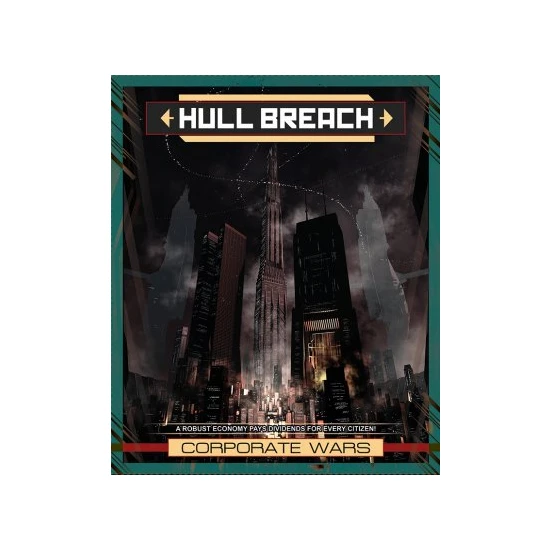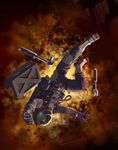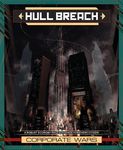


|
|
|
|
2-8
60'
13
Extensive use of text
|
Hull Breach: Corporate Wars

From the rulebook: Hull Breach: Corporate Wars is a tactical, operational, and strategic space-combat and logistics card game for two or more players. Each player has his or her own deck of cards consisting of a Station, ships, modules, Marines, technological breakthroughs, events, and tactics. Players compete head-to-head to destroy each other's fleets and space station; the last player or team standing is the victor. Gameplay: Players choose from a variety of pre-constructed decks or can assemble their own, then each player takes turns either building up their base or building ships to attack their opponents. First player to destroy (or take over from boarding action) is the winner. Each faction/deck has a unique power and varied amounts of resources generated each turn. With these resources you can add on modules to your base, or play ships/marines to the table. Your base functions as a mothership where your subsequent ships make up the fleet you will use for offense and defense. Each turn you will get more resources based on your base and the modules attached (which can add to your resource generation). The ships and marines have different special abilities such as stealth (to avoid enemy detection). Some ships can even retrieve more ships from your deck at no cost. Combat is resolved with d10s. You count up the total amount your roll for offense (based on the current stats of the cards involved) then roll. The target roll is determined by the defense of the ship. Most small ships can only take 1 or 2 hits, but larger ships will need multiple hits to take down. Wounds do carry over but there are mechanisms to remove some wound tokens over time. Second Edition Updated Rules Stackable Traits are no more! To reduce the amount of math that HB Commanders have to do in combat, traits that granted a +X ability are being retooled. Values are now only the printed numbers, and do not increase with any +X effects. Trait-or-Fire! Use your weapons or a trait. That's one of the simplest rules in Hull Breach! It also now applies to stations as well – no more Target Painting for 4 and shooting 6 at the same target with your station. Stations should have advantages but testing reveals that certain station builds were becoming pwnmobiles, capable of ripping apart attacking fleets. Spicing Up Events! The tried-and-true Event cards now have two possible outcomes: a Critical outcome and a Nominal outcome. When you deploy the card, you make a D10 die roll to determine what you'll get. A roll of a 1 or a 10 is a Critical outcome, and is in some cases a more powerful result, and sometimes a bad result for the person wielding the card. Any other roll result is a Nominal outcome, which results in the 'usual' outcome for that card. Faction-Only Cards! Some cards, specifically some Marines, Upgrades and Events, are now marked as Faction-Only, meaning that only the faction printed on the card gets to use them. This has been done in an attempt to work a little more story flavor into the game. For example, Special Operations Groups represent the RDF Marine Corps' elite troops and are no longer available to non-RDF players. As compensation, Corporate Commanders can now field their own elite Marines known as Direct Assault Response Teams (DART). Module Overhaul! There have been significant changes in the world of Modules. In HB Alpha, Modules were further divided into Module-Ship, Module-Station, and Module-Marine cards. No longer! They've been broken into more obviously different types depending on what they attach to, and we've made a more clearer distinction of size on ships, Stations, and Modules. One of the new things we can do is attach multiple mods to ships, and Stations are a little more narrowly restricted to what they can or can't attach, depending on what the purpose of the station is (military versus economy). Say Goodbye to Characters! Character cards were a neat idea. Unfortunately they proved to be too frequently used as the basis for an entire deck strategy. So, they're all dead. Most, however, have been reborn as Add Personnel cards that can be attached to Marines and do something cool for your local units. The tradeoff is that they're no longer independent units that can board ships or stations and fire back at you, and they're nowhere near as powerful as they once were. First-Turn Facefisting is Ancient History! We have implemented a couple of new mechanics at game start that will alleviate most first-turn knockouts. We've achieved this by revising the initiative rules for the starting phase of the game: the Commander with the smallest fleet and Station size (printed on the card, and mentioned above), begins play after the Setup Phase. So, if you deploy fewer or smaller ships than your adversary, you take the first in-sequence turn of the game rather than leave it to a die roll for initiative. New Combat Mechanics! Initiative in Engagements Now controlled by unit size and progresses from the smallest ships up to the largest. The heavies are much slower and more cumbersome than your Fighters and Frigates, so they take longer to get into firing position. Attacker and Defender Volley fire at each other in turn, in order of smallest to largest, with the exception of the defending Station getting first shot. So: Defender station, then attacker's fighters, defender's fighters, attacker's Frigates, etc, all the way up to Capital Ships. New Skirmish Phase The Interceptor Phase has been replaced by Skirmish. Any ships with the trait Interceptor (defending) or Raider (attacking) get to jump to the head of the attack order line, for the first turn only. No more extra turns for defenders! Boarding Actions Just like volley fire, boarding actions (now part of the Maneuver Phase) adhere to initiative rules: smaller ships act first, reflecting the idea that faster and more maneuverable craft have the advantage in landing Marines on-target. Boards are not declared until the start of the Maneuver Phase, and once they're all declared, Escort effects are applied and then they're resolved in ascending size order. You can now only declare a board on a ship of equal class size or larger.
| Mechanics: | Hand Management |
| Categories: | Card Games Science Fiction |
| Alternative names: | |
| This was seen 4289 times | |
From the rulebook: Hull Breach: Corporate Wars is a tactical, operational, and strategic space-combat and logistics card game for two or more players. Each player has his or her own deck of cards consisting of a Station, ships, modules, Marines, technological breakthroughs, events, and tactics. Players compete head-to-head to destroy each other's fleets and space station; the last player or team standing is the victor. Gameplay: Players choose from a variety of pre-constructed decks or can assemble their own, then each player takes turns either building up their base or building ships to attack their opponents. First player to destroy (or take over from boarding action) is the winner. Each faction/deck has a unique power and varied amounts of resources generated each turn. With these resources you can add on modules to your base, or play ships/marines to the table. Your base functions as a mothership where your subsequent ships make up the fleet you will use for offense and defense. Each turn you will get more resources based on your base and the modules attached (which can add to your resource generation). The ships and marines have different special abilities such as stealth (to avoid enemy detection). Some ships can even retrieve more ships from your deck at no cost. Combat is resolved with d10s. You count up the total amount your roll for offense (based on the current stats of the cards involved) then roll. The target roll is determined by the defense of the ship. Most small ships can only take 1 or 2 hits, but larger ships will need multiple hits to take down. Wounds do carry over but there are mechanisms to remove some wound tokens over time. Second Edition Updated Rules Stackable Traits are no more! To reduce the amount of math that HB Commanders have to do in combat, traits that granted a +X ability are being retooled. Values are now only the printed numbers, and do not increase with any +X effects. Trait-or-Fire! Use your weapons or a trait. That's one of the simplest rules in Hull Breach! It also now applies to stations as well – no more Target Painting for 4 and shooting 6 at the same target with your station. Stations should have advantages but testing reveals that certain station builds were becoming pwnmobiles, capable of ripping apart attacking fleets. Spicing Up Events! The tried-and-true Event cards now have two possible outcomes: a Critical outcome and a Nominal outcome. When you deploy the card, you make a D10 die roll to determine what you'll get. A roll of a 1 or a 10 is a Critical outcome, and is in some cases a more powerful result, and sometimes a bad result for the person wielding the card. Any other roll result is a Nominal outcome, which results in the 'usual' outcome for that card. Faction-Only Cards! Some cards, specifically some Marines, Upgrades and Events, are now marked as Faction-Only, meaning that only the faction printed on the card gets to use them. This has been done in an attempt to work a little more story flavor into the game. For example, Special Operations Groups represent the RDF Marine Corps' elite troops and are no longer available to non-RDF players. As compensation, Corporate Commanders can now field their own elite Marines known as Direct Assault Response Teams (DART). Module Overhaul! There have been significant changes in the world of Modules. In HB Alpha, Modules were further divided into Module-Ship, Module-Station, and Module-Marine cards. No longer! They've been broken into more obviously different types depending on what they attach to, and we've made a more clearer distinction of size on ships, Stations, and Modules. One of the new things we can do is attach multiple mods to ships, and Stations are a little more narrowly restricted to what they can or can't attach, depending on what the purpose of the station is (military versus economy). Say Goodbye to Characters! Character cards were a neat idea. Unfortunately they proved to be too frequently used as the basis for an entire deck strategy. So, they're all dead. Most, however, have been reborn as Add Personnel cards that can be attached to Marines and do something cool for your local units. The tradeoff is that they're no longer independent units that can board ships or stations and fire back at you, and they're nowhere near as powerful as they once were. First-Turn Facefisting is Ancient History! We have implemented a couple of new mechanics at game start that will alleviate most first-turn knockouts. We've achieved this by revising the initiative rules for the starting phase of the game: the Commander with the smallest fleet and Station size (printed on the card, and mentioned above), begins play after the Setup Phase. So, if you deploy fewer or smaller ships than your adversary, you take the first in-sequence turn of the game rather than leave it to a die roll for initiative. New Combat Mechanics! Initiative in Engagements Now controlled by unit size and progresses from the smallest ships up to the largest. The heavies are much slower and more cumbersome than your Fighters and Frigates, so they take longer to get into firing position. Attacker and Defender Volley fire at each other in turn, in order of smallest to largest, with the exception of the defending Station getting first shot. So: Defender station, then attacker's fighters, defender's fighters, attacker's Frigates, etc, all the way up to Capital Ships. New Skirmish Phase The Interceptor Phase has been replaced by Skirmish. Any ships with the trait Interceptor (defending) or Raider (attacking) get to jump to the head of the attack order line, for the first turn only. No more extra turns for defenders! Boarding Actions Just like volley fire, boarding actions (now part of the Maneuver Phase) adhere to initiative rules: smaller ships act first, reflecting the idea that faster and more maneuverable craft have the advantage in landing Marines on-target. Boards are not declared until the start of the Maneuver Phase, and once they're all declared, Escort effects are applied and then they're resolved in ascending size order. You can now only declare a board on a ship of equal class size or larger.
| Mechanics: | Hand Management |
| Categories: | Card Games Science Fiction |
| Alternative names: | |
| This was seen 4289 times | |















